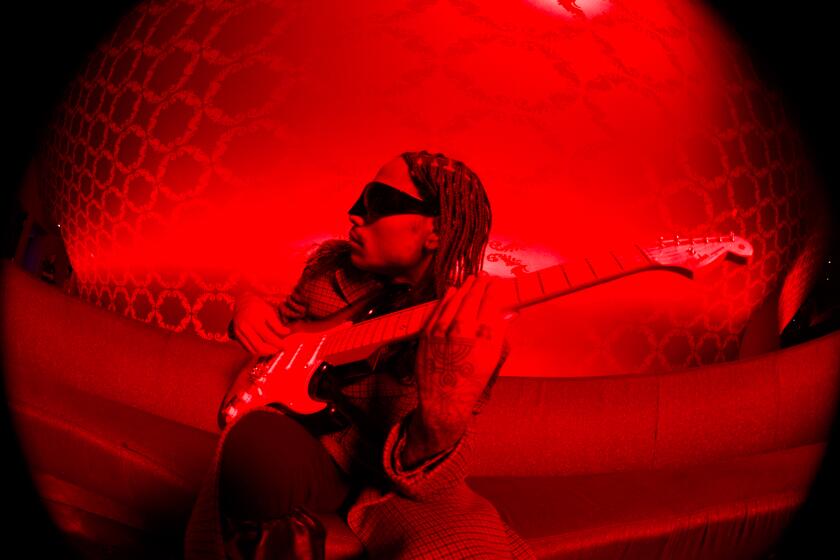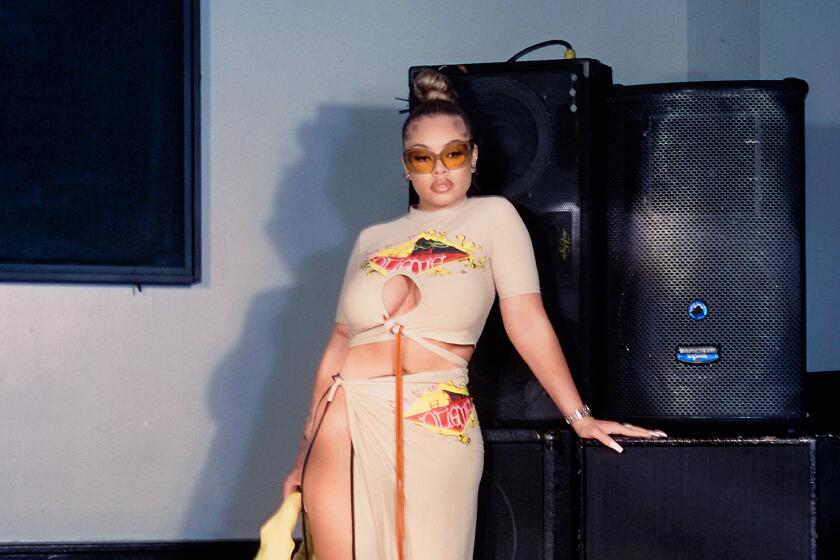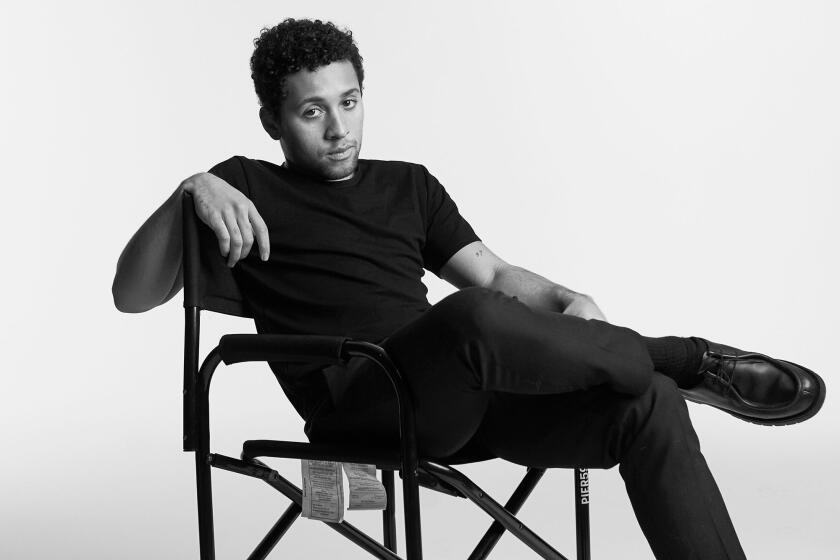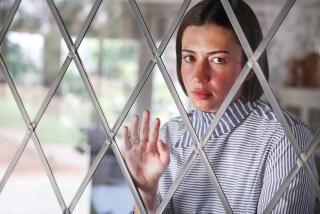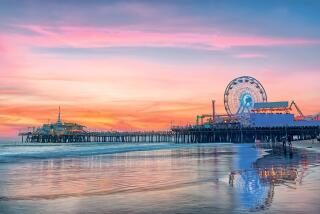‘You’re obviously a target’: Rappers rethink security protocols in wake of PnB Rock killing
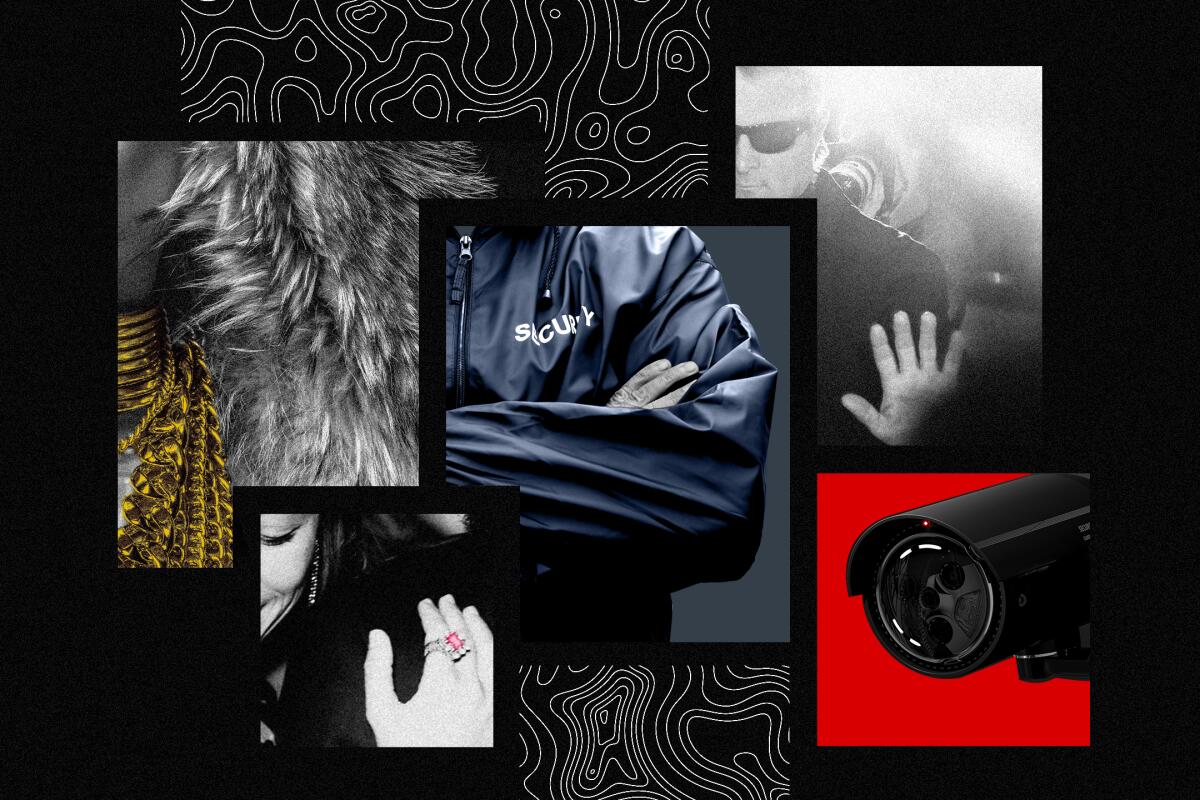
- Share via
Rapper Glasses Malone is a regular at the South L.A. Roscoe’s House of Chicken & Waffles where fellow artist PnB Rock was shot and killed last month.
“I’ve been going there my whole life. I’ve probably eaten there 200 times,” said Malone, a 42-year-old “proud Crip member” and collaborator with Kendrick Lamar, Lil Wayne and Ty Dolla Sign who grew up in nearby Watts and Compton.
PnB Rock’s killing, during a robbery of the rapper’s diamond-studded necklace and other jewelry, was difficult news for Malone to hear. But it wasn’t surprising.
“Just having money in general, especially when you’re showcasing cars or things on your body, you’re obviously a target,” he said. “Hip-hop often tries to sell wealth and success on social media. But at some point, you’re just giving somebody a list of potential victims.”
The city’s Black music community has suffered a string of high-profile and violent losses of life over the last couple of years. In the last month alone, three rappers — PnB Rock (born Rakim Allen), Compton’s Kee Riches (Kian Nellum) and Inglewood’s Half Ounce (Latauriisha O’Brien) — were killed in L.A. Beloved MC Drakeo the Ruler was stabbed to death at the Once Upon a Time in L.A. festival in Dec. 2021; just weeks prior, Jacqueline Avant, wife of famed music executive Clarence Avant, was killed during a home invasion in Beverly Hills. In Feb. 2020, 20-year-old rising star Pop Smoke, visiting L.A. from New York, was shot and killed in a home invasion after inadvertently posting the address of a Hollywood Hills rental home on Instagram. The year before that, local icon Nipsey Hussle was murdered outside his clothing boutique in South L.A.
Celebrities have increasingly become targets of brazen burglaries as well. Rapper Tee Grizzley lost more than $1 million in jewelry during a burglary at his Porter Ranch home last month. Ariana Grande, Chris Brown and Taylor Swift have endured recent break-ins at their homes. Kim Kardashian, then married to Kanye West, was bound and robbed of her $4-million engagement ring in Paris in 2016.
Amid wider debates about rising violent crime rates in L.A. and nationwide, many artists are taking new measures to stay safe.
“I’ve seen violence my whole life. It just doesn’t look quite the same today,” Malone said. “I’ve signed million-dollar deals, but I don’t buy jewelry. You can see we’re in a really bad situation, it’s a stage of desperation setting in. I refuse to present myself as an easy opportunity.”
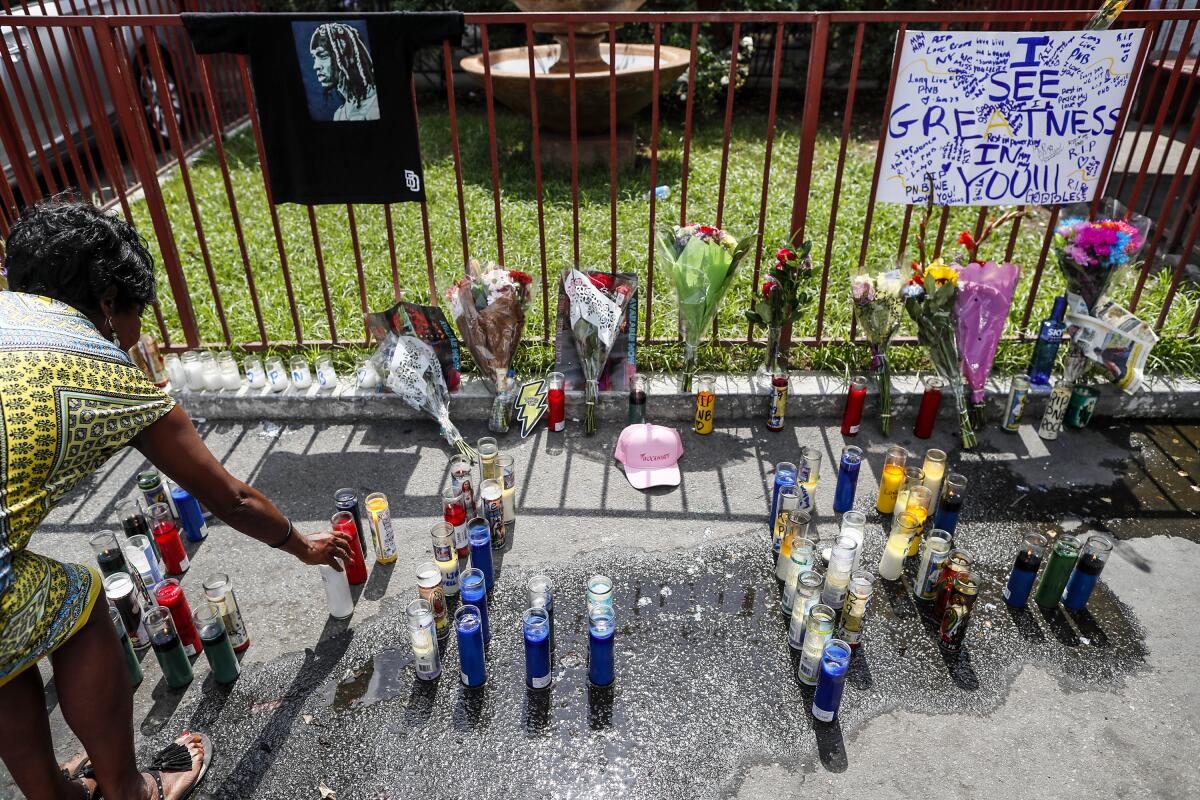
Historically, musicians have had a close relationship with their security details. The 1992 film “The Bodyguard’’ dramatized the intimacy between a pop singer and her protector. Tupac Shakur’s bodyguard Frank Alexander and the Notorious B.I.G.’s Gene Deal entered their clients’ lore during the ’90s gangsta rap feuds. Lady Gaga and Adele are often spotted with the former Mr. Europe Peter Van Der Veen glowering above them. Beyoncé’s handler Julius de Boer separated her husband, Jay Z, and sister Solange during their infamous elevator fight.
But artists and managers face a more complex set of threats today than a decade ago. Social unrest and economic inequality have raised tensions across the country, while social media offers new ways for criminals to find potential victims. The proliferation of guns can turn lower-stakes conflicts bloody in an instant.
In 2021, the LAPD reported that homicides in Los Angeles had increased by 11.8% and robberies 5.5% over the previous year, after falling to record lows in 2019. However, last year’s totals are still far below those of the ’90s (when L.A. had half a million fewer residents) or even the mid-2000s. Many U.S. cities have seen similar recent rises in homicides. The last decade remains the safest in L.A. history.
The Compton singer-guitarist topped the charts with ‘Bad Habit.’ Now he’s a Grammy contender, on his own terms: ‘I didn’t have to change to do it.’
Still, artists are worried. L.A. rapper Roddy Ricch, 23, wrote recently on Instagram: “It’s too much senseless violence. Too much opportunity and motivation to take things other people work hard for. It’s too much life to live to take someone else’s away. I love my city but we can’t keep going out like this.”
“Every time I see one of my friends bleed out on camera or killed on camera, I feel a sick feeling I can’t even really explain,” Meek Mill wrote last month on Twitter, about PnB Rock. “It puts me more and more back in survival mentality!”
“LA is a dangerous place now… doesn’t matter if you are a celebrity or not,” Ice-T wrote in the wake of Rock’s slaying. “If you notice, LA rappers don’t wear a lotta Jewelry... Me, Snoop, Cube, Dre, Game, Kendrick..The list goes on.. It’s not cause we’re broke. LA is just a dangerous place, rapper or not. Why test the streets.”
PnB Rock’s killing was especially unnerving, as it occurred in broad daylight at a popular local restaurant.
Rock played a role in some of hip-hop’s biggest hits in the mid-2010s, from his song “Selfish” to YFN Lucci’s “Everyday We Lit.”
For the record:
5:05 p.m. Oct. 24, 2022This article says Shauntel Trone was charged with robbery and being an accessory after the fact. She was not charged with robbery.
Police initially speculated that his girlfriend’s location-tagged Instagram story may have led to his killing Sept. 12. Prosecutors later charged Freddie Lee Trone and his 17-year-old son with murder. Both were in the parking lot before the photo was posted, according to law enforcement sources. A third suspect, Shauntel Trone, 38, has been charged with robbery and being an accessory after the fact. No suspects have been arrested in Half Ounce or Kee Riches’ killings.
Barry “Hefner” Johnson, who manages Atlanta rappers JID and Earthgang among others, said his artists aren’t flamboyant with their jewelry. But for artists who do flaunt their wealth in public, he feels security is “1,000%” needed, even if the performers don’t feel the same way.
“Some folks have the ego, ‘ain’t s— gonna happen to me, I’m really like that, I’m gangsta,’” Johnson said. “That’s the worst mentality to have, because then you think you’re invincible. You think you’re the baddest person on the planet, and unfortunately, that’s just not true. Anybody can be caught at any given time.
“For artists in general, and especially our Black artists, if you’re going to invest in your appearance through jewelry, watches and all these things to shine like a diamond, you’ve got to protect yourself like a diamond. When you walk into a jewelry store, the jewelry is locked up in a glass case, protected. If you don’t value those things the way the people you buy them from value them, then you don’t value yourself.”
Malone agreed that while custom-made, diamond-encrusted necklaces look great in videos, they’re a liability in real life.
“L.A. natives know the normal routine. If you saw Snoop walking around in ’93, there was nothing to rob from him,” Malone said. “If Taylor Swift or Ariana Grande went to the ghetto with jewelry, they’re going to get robbed too. Where I come from, if you see a quarter-million dollars of jewelry on somebody, that’s a once-in-a-lifetime opportunity.”
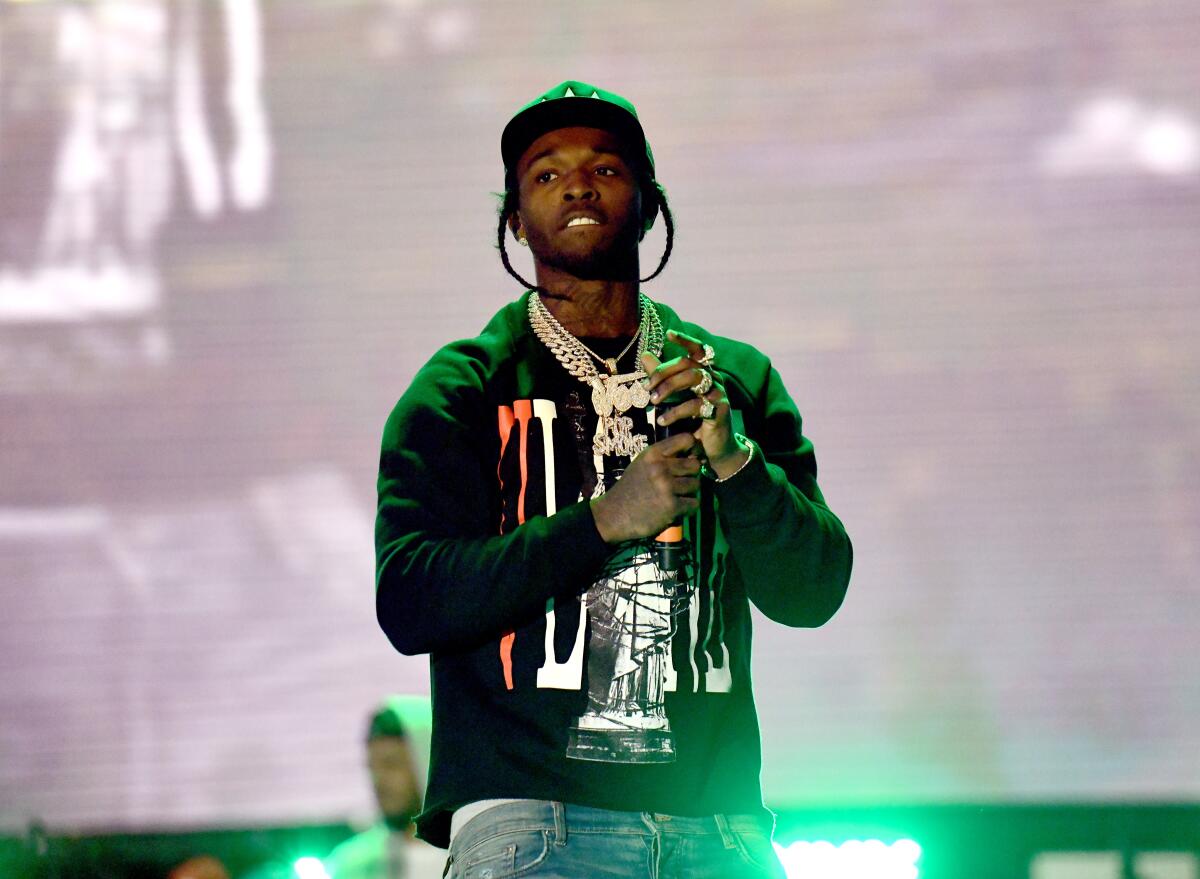
While acts might have once just hired their beefiest friends from high school to protect them, nowadays, cybersecurity and physical safety have meshed into a more complicated job for bodyguards.
“Rappers have the highest risk of anyone in the entertainment industry, and they have the worst security,” said Kent Moyer, chief executive of the World Protection Group, a private security firm in Beverly Hills. “They can’t get out of the mind-set of just using their 6-foot, 10-inch, 300-pound ‘buddyguard.’ Bad guys are getting pretty smart at doing surveillance, and you can only counter that through training.”
He’s not surprised that social media may have played a role in the deaths of Pop Smoke and Memphis, Tenn., rapper Young Dolph, who was killed outside a bakery there that he had recently posted about on Instagram.
“I’ve worked on thousands of stalker cases, and a lot of times, social media gives you the locations and habits of individual celebrities,” Moyer added. “That every Wednesday, they go to the Ivy for lunch. Bad guys are out there tracking this stuff.”
In the past year, the 23-year-old Atlanta native scored her first Top 10 hit with “Big Energy,” performed alongside Mariah Carey and toured arenas with Lizzo.
Yet being a musician requires a public identity, online and off. An artist without a lively TikTok or Instagram presence will struggle for attention today.
While Moyer recommends significant steps for very famous acts — an untraceable corporation to acquire property and a two-person armed security detail, among them — stricter digital hygiene is an absolute requirement.
“We know artists have to do their thing, to perform live and be visible on socials,” Moyer said. “So if they’re doing a photo shoot at a place they’re staying, we’d recommend not to, because there’s a probability of someone finding their address and coming in the middle of the night like with Pop Smoke.”
He described Chris Brown’s 2019 yard sale at his Tarzana home as “the dumbest thing in the world.” Just weeks later, burglars broke into that house.
Some artists forbid their teams to share immediate locations on social media — or anything that could tip off criminals to their whereabouts.
Kosha Dillz, a rapper from New Jersey who made his reputation freestyling on Hollywood Boulevard, used to relish alerting his fans online so they could come support him, until he decided it wasn’t worth the risk.
“I used to post, ‘Hey, pull up here,’ but I stopped telling people when I was doing stuff because I didn’t want everyone to know exactly where I was at,” Dillz said. “There would be be random chaos or tourists, people who could start something at any moment. You had to have your Spidey senses up and know when it’s time to dip.”
Even made-up violence adds to a climate of fear. Johnson recalled a July incident where two teenage rappers claimed to have robbed his artist SoFaygo, taunting the “Knock Knock” rapper to “come get his watch back” on Instagram.
Although their story was fiction, it spread like wildfire on rap blogs, moving SoFaygo’s loved ones to fear for his life.
“They’re even faking robberies now,” Johnson said. “That’s what kids think they have to do to receive attention.”
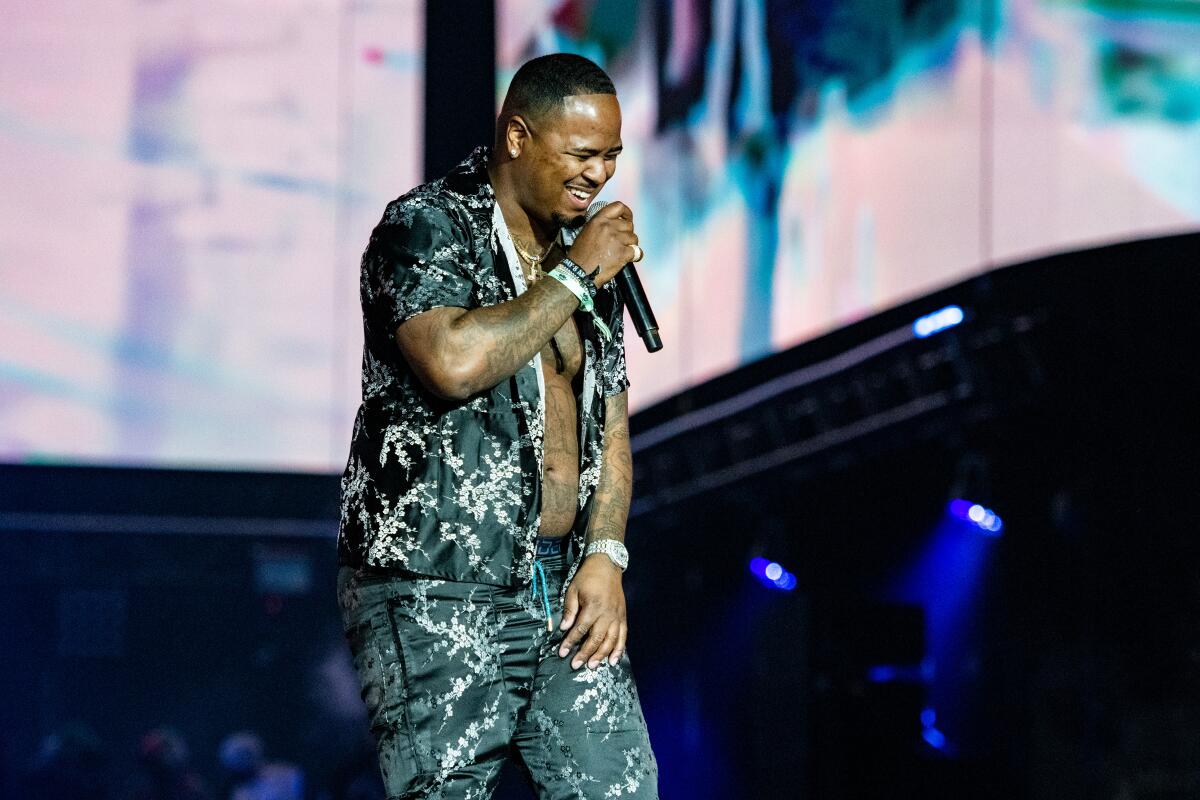
Charis E. Kubrin is a criminology professor at UC Irvine whose work focuses in part on marginalized communities, crime and hip-hop (she co-wrote a book, “Rap on Trial,” about rap lyrics’ use in criminal cases). She said that while the recent killings of rappers in L.A. are certainly troubling, it’s difficult to attribute them to any specific cause or know if they’re truly escalating.
“Social media can make violence appear to be increasing, even if data say it’s not,” Kubrin said. “But on the other hand, it’s a big mistake not to acknowledge that we need to be responsive and care about this.”
The former ‘Daily Show’ correspondent on Trevor Noah’s departure, his favorite ‘90s house bangers and the comedic genius of Lil Wayne.
In a time of economic disparity, easily obtained guns and a city full of wealthy artists, it’s no surprise they’d be pursued.
“Celebrities are targeted because they are good targets — they’re rich and famous,” Kubrin said. “But we’re also seeing all kinds of frauds, scams and economically motivated crimes up. This is bigger than rappers posting information about their location.
“We have such deep inequality in L.A., coupled with joblessness, the pandemic, social unrest and more people carrying guns. The response is usually finding individual things to do: Don’t wear jewelry, don’t post on socials. That’s important, but we’re not going to get rid of this problem without attacking root causes.”
For Malone, who grew up in an incredibly violent era of L.A. music, that’s as true now as it always has been.
“Any poor place without a lot of opportunity creates desperation. If you don’t make an effort to care, people will do what they do,” he said. “Culture comes from the poorest places. If everyone runs away from our communities, it’s going to be tough to monetize us later.”
More to Read
The biggest entertainment stories
Get our big stories about Hollywood, film, television, music, arts, culture and more right in your inbox as soon as they publish.
You may occasionally receive promotional content from the Los Angeles Times.
